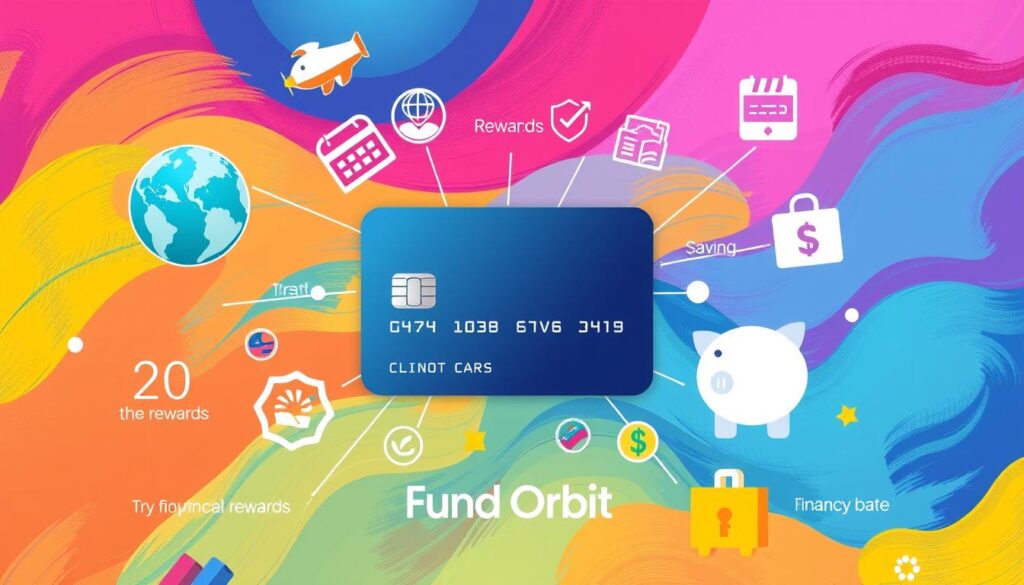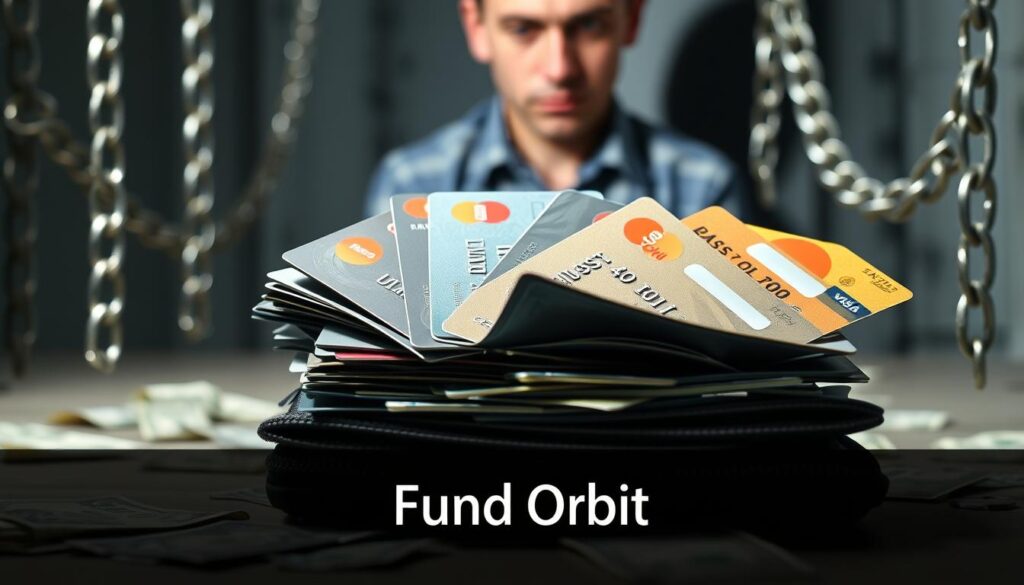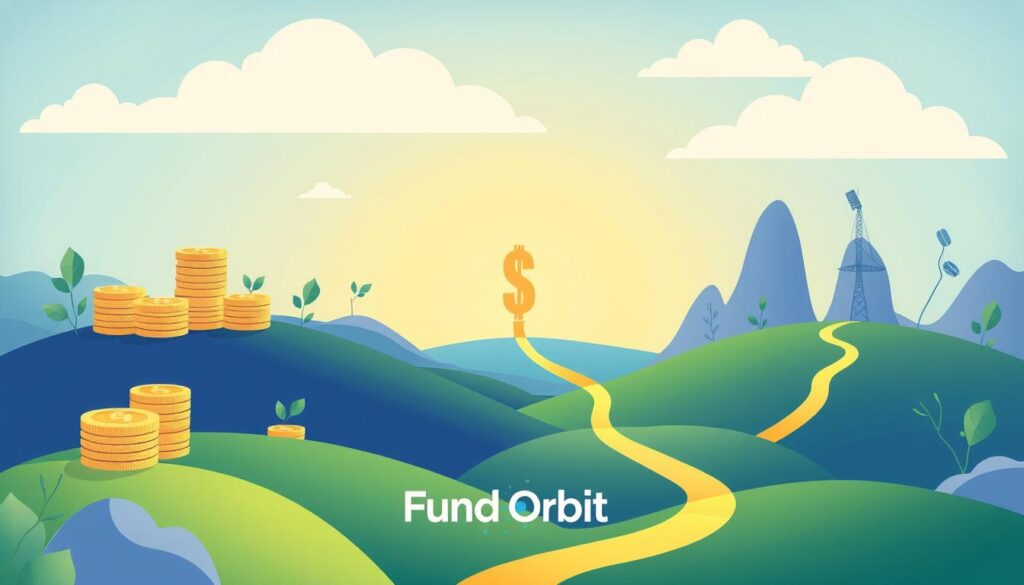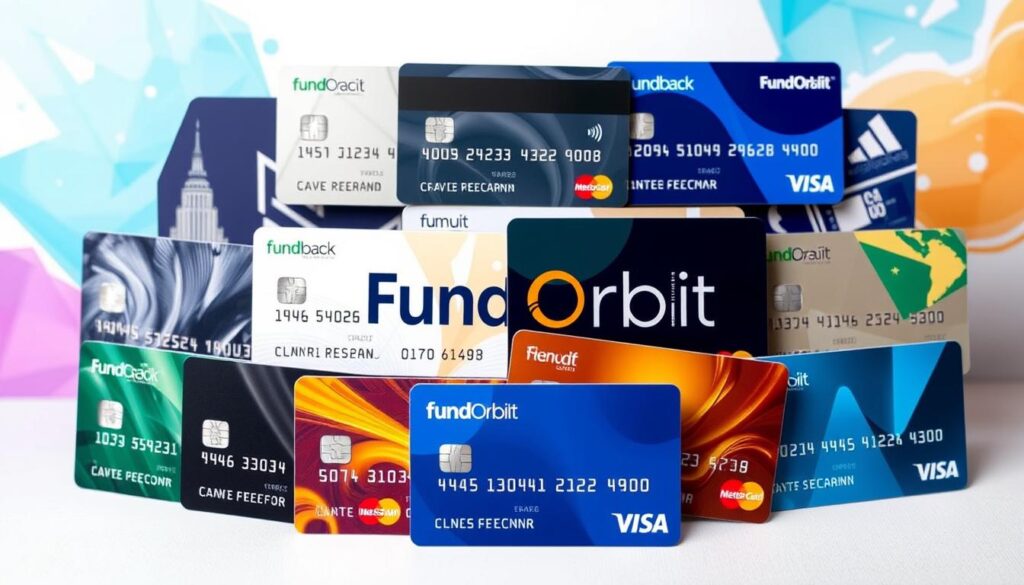Good credit is key in today’s world. It affects loans, rentals, and jobs. We aim to help you understand credit cards and loans. This way, you can make smart financial choices and gain freedom.
Choosing the right credit card or loan is important. There are many options, making it hard to decide. Knowing about credit scores and how to improve them helps. Credit cards and loans can help you financially, but use them wisely.
We’ll talk about credit utilization, payment history, and credit mix. We’ll also cover different credit cards, like rewards and low-interest ones. This knowledge helps you pick the best card and use loans wisely.
Introduction to Credit Cards and Loans
We’ll dive into the good and bad of credit cards and loans. You’ll learn how to pick the right card and manage debt. Our goal is to give you a full understanding of these financial tools. This way, you can make smart choices for your future.
Key Takeaways
- Maintaining good credit is key for financial stability and opportunities.
- Credit cards and loans can help financially if used right.
- Knowing about credit scores and utilization is vital for smart choices.
- Choosing the right credit card and loan helps reach your goals.
- Managing debt well and consolidating when needed is important.
- Credit cards and loans offer benefits like rewards and low-interest rates.
Understanding Credit Cards and Loans
Managing our finances can be easier with credit card deals and loans. It’s important to know the different types of credit cards and loans. By comparing loans and credit cards, we can find what works best for us.
Credit cards offer benefits like cashback and rewards. But, they also have interest rates and fees. Personal loans, on the other hand, can help with debt or big purchases. Their interest rates vary from 5% to 36%.
What Are Credit Cards?
Credit cards let us borrow money that we can pay back later. They often have special rates and rewards. It’s key to understand the terms to get the most from credit card deals.
Types of Credit Cards
There are many types of credit cards, like cashback and rewards cards. Each has its own benefits, like sign-up bonuses and 0% introductory APRs. When picking a credit card, it’s important to compare loans and credit cards to find the best fit.
What Are Personal Loans?
Personal loans help with debt, big purchases, or unexpected costs. They have fixed payments, making budgeting easier. When looking at personal loans, it’s vital to compare loans and credit cards. This helps us choose based on interest rates, fees, and how we’ll pay back the loan.
Advantages of Using Credit Cards
Using credit cards can offer many benefits. These include building credit, earning rewards, and accessing emergency funds. We can find the best credit card offers, like low-interest loans and cashback rewards, to enhance our use of credit cards.
Some key benefits of using credit cards are:
- Earning rewards and perks, such as cashback or travel rewards
- Building credit history, which can help us qualify for lower interest rates on loans and credit cards
- Having emergency access to funds, which can be helpful in unexpected situations
Many credit cards also come with extra benefits. These include purchase protection and credit card fraud protection. These benefits can give us peace of mind and protect us from financial losses. By using credit cards wisely and taking advantage of these benefits, we can achieve our financial goals.

It’s important to keep our credit utilization ratio under 30 percent to maintain a good credit score. By using credit cards wisely and keeping our credit utilization ratio in check, we can enjoy the benefits of using credit cards while minimizing the risks.
| Credit Card Benefits | Description |
|---|---|
| Purchase Protection | Protects against loss, theft, or damage of purchased items |
| Credit Card Fraud Protection | Protects against unauthorized transactions and financial losses |
Risks Associated with Credit Cards
Credit cards can be useful for building credit and getting quick cash. But, they also have big risks. High-interest rates can make it hard to pay off debt. It’s key to compare loans and know how they affect your credit score.
Managing debt well means understanding credit utilization ratios. Credit utilization ratio is how much credit you use compared to what’s available. Keeping this ratio under 30% is good for your credit score. For example, with a $10,000 limit, aim to owe less than $3,000.

High-Interest Rates
High-interest rates can make unpaid balances very costly. For example, a $1,000 charge at 18% interest could add $175 in interest in a year. This leaves you with $946 to pay back. It’s vital to know your credit card’s terms and look for better deals or rates.
Impact on Credit Scores
A late payment can hurt your credit scores a lot. If it’s over 30 days late, it might be reported to credit bureaus. This can stay on your report for up to seven years. It shows why managing debt well and understanding loan approvals are so important.
| Credit Score Range | Classification |
|---|---|
| 300-579 | Poor |
| 580-669 | Fair |
| 670-739 | Good |
| 740-850 | Excellent |
Knowing these risks and managing debt wisely can help. Keeping credit utilization ratios low and paying on time can prevent harm. This way, you can better navigate the loan approval process and find great credit card deals.
Personal Loans: Pros and Cons
When looking at loan options, it’s key to know the good and bad of personal loans. They can help with debt or big buys, but they also have risks.
Personal loans can merge credit card debt into one payment with a better rate and term. Fixed monthly payments are a plus, unlike credit cards with payments based on balance.
Pros of Personal Loans
- Lower interest rates than most credit cards
- Fixed monthly payments
- Predictable monthly costs for a set time
Cons of Personal Loans
- Origination fees, 1% to 8%
- Prepayment penalties
- Short-term credit score drop from inquiry
It’s important to look at best credit cards and loan options, including credit card deals for rewards or cash back. Knowing the pros and cons helps us choose wisely for our finances.

Personal loans can help with debt and big buys, but we must check the terms carefully before deciding.
| Loan Type | Interest Rate | Fees |
|---|---|---|
| Personal Loan | 12.33% | 1% – 8% origination fee |
| Credit Card | 23.37% | Annual and late fees |
How to Choose the Right Credit Card
Choosing the right credit card involves looking at several factors. We consider credit card benefits, the loan approval process, and the top credit card offers. We also think about our spending habits, fees, and rates, and compare different cards.
It’s important to check the fees and rates of a credit card. We look for cards with low or no annual fees. We also consider the interest rates, which can be between 15% and 25%. Some cards offer 0% APR for a while or have low rates, which is great for emergencies or when income is irregular.
The loan approval process is another key factor. It depends on the issuer and our credit score. We might choose cards with easier approval, like student or secured cards. These cards often have lower limits and need a deposit.
When comparing cards, we look at the top credit card offers. This includes rewards, cashback, and travel perks. Some cards offer bonuses or points for certain purchases, like gas or groceries. We also value cards with features like automatic limit increases, debt plans, and fraud protection.

The best credit card for us depends on our needs and spending. By carefully looking at credit card benefits, loan approval process, and top credit card offers, we can pick a card that fits our financial goals.
| Credit Card Type | Features | Benefits |
|---|---|---|
| Student Credit Card | Lower credit limits, tools for managing finances | Easier approval process, building credit history |
| Secured Credit Card | Security deposit, lower credit limits | Building credit history, lower fees |
| Rewards Credit Card | Reward points, cashback, travel benefits | Earning rewards, sign-up bonuses |
Loan Options for Different Needs
There are many loan options for different needs. You can choose from low-interest loans, credit card deals, and more. It’s important to compare loans and their terms to make a good choice.
Loans come in types like secured and unsecured, and short-term and long-term. Secured loans need collateral, like a house or car. Unsecured loans don’t need collateral. Short-term loans are paid back quickly, while long-term loans take years.
Secured vs. Unsecured Loans
Secured loans often have lower interest rates but risk losing collateral if not repaid. Unsecured loans have higher rates but no collateral needed. We should think about our financial situation and choose wisely.
Short-Term vs. Long-Term Loans
Short-term loans are good for emergencies or unexpected costs. Long-term loans are best for big purchases, like a house or car. We should compare to find the right fit for our needs and budget.
Understanding the different loan options and comparing them helps us make smart choices. This way, we can find the best low-interest loans and credit card deals for our needs.
| Loan Type | Interest Rate | Repayment Period |
|---|---|---|
| Secured Loan | 6-12% | 1-5 years |
| Unsecured Loan | 10-20% | 1-3 years |
| Short-Term Loan | 15-30% | Up to 1 year |
| Long-Term Loan | 8-15% | 5-10 years |
Managing Credit Card Debt
Understanding credit card debt is key. The average American household has over $21,000 in credit card debt. It’s important to find ways to pay off debt and avoid financial trouble. Credit cards offer rewards and perks, but overspending can happen if not managed well.
To handle credit card debt, knowing the loan approval process and its impact on your credit score is vital. Paying off the card with the highest interest rate first can save you money. Also, look for top credit card offers with 0% balance transfer options to pay off debt quicker. For more tips on managing credit card debt, check out this resource.

- Paying more than the minimum payment each month
- Prioritizing payments towards the credit card with the highest interest rate
- Obtaining a copy of your credit report to identify debt issues
By following these tips and understanding thecredit card benefitsandloan approval process, you can manage your credit card debt. This will help you achieve financial freedom.
Consolidating Debt: Is It Right for You?
When looking at loan options to handle debt, comparing loans and credit card deals is key. Consolidating debt can be helpful, but knowing the pros and cons is important. We’ll look at different loan options, like debt consolidation loans, to guide your choice.
One big plus of debt consolidation is saving on interest. By merging debts into one loan with a lower rate, you can cut down on interest costs. But, make sure to check the new loan’s terms and fees to see if it’s right for you.
When checking out loan options, consider these:
- Interest rates: Choose loans with lower rates to save on interest.
- Fees: Watch out for fees like origination or balance transfer fees.
- Repayment terms: Look at the loan’s length and monthly payments to fit your budget.
By comparing loans and credit card deals, you can decide wisely on debt consolidation. Remember, a good credit score can help you get better rates on consolidation loans.
Debt consolidation can be a great way to manage credit card debt, but weigh the pros and cons carefully. Understanding your options and evaluating each loan’s terms will help you choose the best for your finances.
| Loan Type | Interest Rate | Fees |
|---|---|---|
| Debt Consolidation Loan | 5-10% | 1-6% origination fee |
| Balance Transfer Credit Card | 0% introductory APR | 3-5% balance transfer fee |
Conclusion: Your Path to Financial Freedom
Exploring credit cards and loans shows us the importance of careful thought in personal finance. These tools can help us achieve financial freedom, but we must use them wisely. We’ve looked at both the benefits and risks, preparing you to make smart choices for your future.
Knowing how credit cards and loans work helps you build a solid financial base. They can help you build credit history, get emergency funds, or pay off high-interest debt. The secret is to manage your money well and stay smart about it.
Starting your path to financial freedom? Use the tools and resources at your disposal. Create a budget, find ways to manage debt, and ask for advice from experts. With the right strategy, you can make the most of credit cards and loans for a better financial future.


